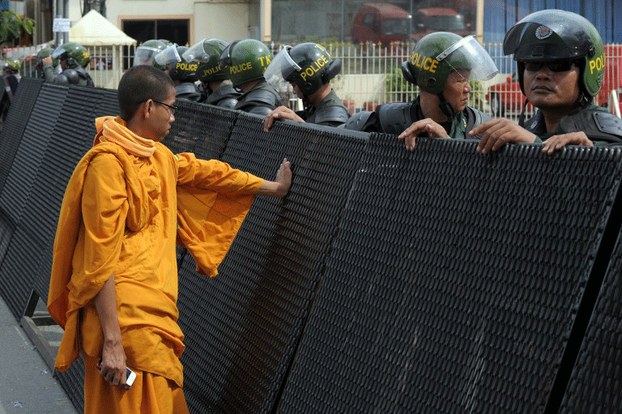Cambodia's parliament passes laws 'threatening judicial independence'
| Publisher | Radio Free Asia |
| Publication Date | 23 May 2014 |
| Cite as | Radio Free Asia, Cambodia's parliament passes laws 'threatening judicial independence', 23 May 2014, available at: https://www.refworld.org/docid/5391ba2fd.html [accessed 26 May 2023] |
| Disclaimer | This is not a UNHCR publication. UNHCR is not responsible for, nor does it necessarily endorse, its content. Any views expressed are solely those of the author or publisher and do not necessarily reflect those of UNHCR, the United Nations or its Member States. |
2014-05-23
 A Cambodian Buddhist monk (L) stands next to a barricade in front of police near the Phnom Penh Municipal court, May 6, 2014. AFP
A Cambodian Buddhist monk (L) stands next to a barricade in front of police near the Phnom Penh Municipal court, May 6, 2014. AFP
Cambodia's opposition-boycotted parliament has unanimously approved a set of judicial laws that rights groups say will give Prime Minister Hun Sen's government effective control over the judiciary and further undermine the independence of courts.
All members of the ruling Cambodian People's Party (CPP) in the National Assembly agreed to adopt the laws which in effect put the minister of justice at the center of all key decision-making by the judiciary and by the Supreme Council of the Magistracy (SCM), the body charged with appointing, disciplining, and overseeing the country's judicial system.
The CPP MPs approved the law on the Organization and Functioning of the Supreme Council of the Magistracy and the Law on the Statute of Judges and Prosecutors on Friday and the Law on the Organization of the Courts on Thursday.
Lawmakers from the opposition Cambodian National Rescue Party (CNRP) have been boycotting the assembly in protest against the result of the July 2013 general election, which they said was marred by fraud.
Criticism
During the debate before the approval of the laws, a CPP legislator criticized the current judicial system, calling on Justice Minister Ang Vong Vathana to take action against judges and prosecutors who did not adhere to the law.
"The law on Functioning of the Supreme Council of the Magistracy is an important law to oversee works of judges and prosecutors," MP Loy Sophat from Prey Veng province said.
"As you may be aware, our court previously had a good reputation and now people don't value and trust the court," he said before the assembly's floor.
In response, Ang Vong Vathana said the ministry was in charge of judicial administration and budget and disseminates information and provides training to judges and prosecutors but it could not punish them if they flout the law.
"The Supreme Council of the Magistracy will [have provisions to] punish any judges and prosecutors who make mistakes," he said, adding, "I am not in the disciplinary council."
Last week, 34 local civil society organizations and labor unions as well as the Geneva-based International Commission of Jurists and U.S.-based Human Rights Watch called for a delay in the debate on the draft laws, which had not been released for public consultation with civil society and relevant stakeholders as required by the constitution.
In a joint statement, they said provisions in the laws "jeopardize the independence of the judiciary" guaranteed under the constitution and the United Nations.
'Excessive power'
They said that the law on the Organization and Functioning of the Supreme Council of the Magistracy "provides excessive power to the Minister of Justice to control and lead the decision-making process of the Supreme Council of the Magistracy."
In addition, the Law on the Organization of the Courts empowers the justice minister to govern and control and manage the budgets of all tribunals while the Law on the Statute of Judges and Prosecutors empowers the minister to advance and promote judges and prosecutors as well as placing judges and prosecutors under the central administration of the ministry.
"These issues, among others concerns, undermine the independence of the courts and the impartiality of judges and prosecutors," the statement said.
"As such, these three draft laws cannot guarantee the separation of power between legislative, executive, and judicial branches in accordance with Article 51 of the Constitution."
The groups stressed that the Supreme Council of the Magistracy was "crucial" to the separation of powers.
"It must remain independent so that it can fulfill its constitutional function to assist the King in ensuring the independence of judicial power."
Defense
Minister of Interior Sar Kheng on Thursday defended the CPP's move to push through with the laws.
He criticized CNRP lawmakers for not showing up at the assembly to debate the laws, saying it would be difficult to make any changes after the legislations take effect.
"Maybe they don't have enough votes to make any changes to the law," he said.
After the July 28 polls, which the opposition maintains were fraught with irregularities, the government-appointed National Election Committee declared the CPP the winner with 68 seats in parliament to the CNRP's 55, but the CNRP claimed it had won at least 63.
CNRP spokesman Yim Sovann said that the party has boycotted the assembly as a sacrifice for long term benefits.
He said that the party would make changes to the laws when it has the power in the future.
"People will support us. We will have enough votes in the assembly and we will amend the law," he said.
Reported by RFA's Khmer Service. Translated by Samean Yun. Written in English by Parameswaran Ponnudurai.
Link to original story on RFA website
